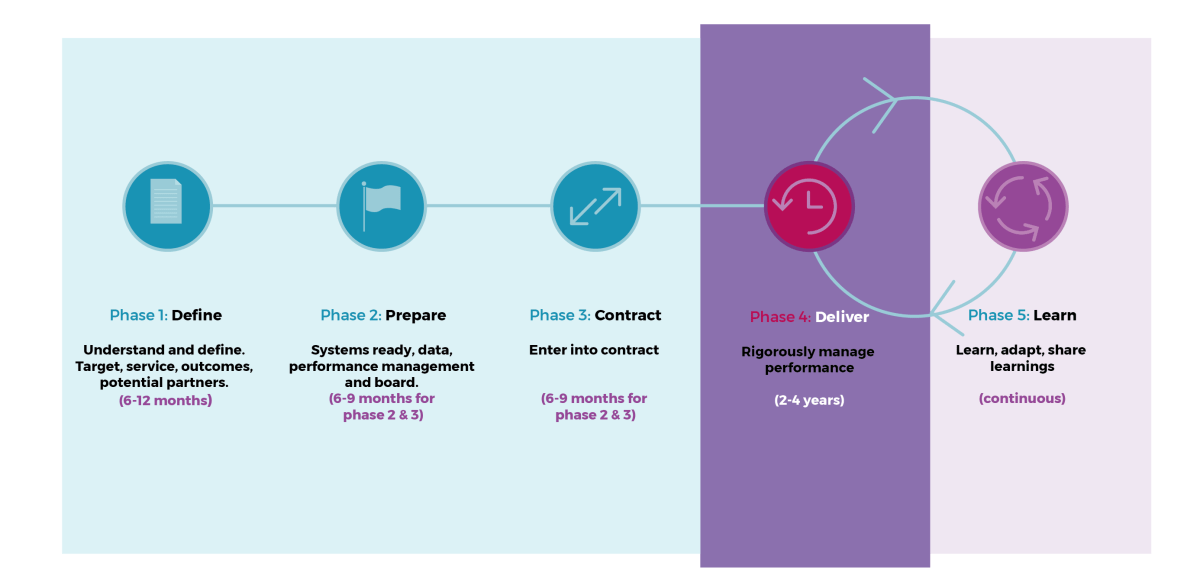However much scenario planning you’ve done, delivering a SIB is difficult and issues will come up during the lifetime of the contracts.
If there are clear governance and decision-making processes in place, it is much easier to deal with the inevitable unforeseen challenges as they happen and support timely improvement in service delivery?
Having mechanisms in place up-front will help you feel confident to raise urgent and critical issues with the board – a monthly forum, if appropriate. Try to see your board as allies: share information about problems or setbacks and ask for help when it’s needed. The board should support you in modifying outcomes if required and may be able to bring in additional resources.
Masterclass: Addressing an issue with your board
Tips contributed by a SIB provider
- Acknowledge the problem
e.g. We have recruited fewer participants than forecast
- Collate supporting data to build a full picture of the consequences
e.g. Actual vs forecast recruitment numbers, participation in activities
- Analyse reasons for difference
e.g. Project kick-off delayed by staff absence during the summer holiday period
- Gather recommendations from the team and summarise for the board
-
What do we need to do more/less of?
-
What additional resources are required?
-
What is the forecast impact on timing and outcomes?
- Make decisions with input from board
-
Replace project manager within two months
-
Reduce expected outcomes by 5%
Here are some common SIB delivery issues we have come across, and how boards have helped to avoid or address them.
| Problems with delivery organisation staffing: | |
|---|---|
|
Problem |
Solution (to avoid or address problem) |
|
Delays to recruit well-qualified staff |
|
|
Variable management of staff performance, resulting in sub-optimal delivery |
|
|
Failure to keep the team fully functioning right up to the end of the programme |
|
| Problems with recruiting participants: | |
|---|---|
|
Problem |
Solution (to avoid or address problem) |
|
Failure to market the programme to those responsible for referrals (e.g. social workers) |
|
|
Inadequate IT system for referral of participants |
|
|
Insufficient resources within the referring authority to manage the essential tasks required |
|
| Problems with claiming outcomes: | |
|---|---|
|
Problem |
Solution (to avoid or address problem) |
|
Poorly-defined contractual outcomes lead to lack of clarity in claims |
|
|
Administrative or teething problems with claims process |
|
Masterclass: Tips for performance management and governance
Contributed by Dr Dr Tony Munton, managing director, TheRTK
TheRTK works with organisations to help them get the greatest value from their performance data, so that it becomes a key strategic asset. The key issues that organisations usually need help with are around performance management and governance.
Tips for performance management:
-
Keep it simple! A key reason for failure of a performance management system is having too many KPIs. Keep things basic. Pick three top KPIs – your top three “obsessions”.
-
Every month, provide a summary dashboard (see tool below) showing for all three KPIs:
-
What is the “story behind the curve”? (i.e. why does the graph look like that?)
-
Who are your partners, to get the numbers to change?
-
What do you know about what works to change the numbers? Where are the gaps in your knowledge?
-
What are you going to do about it (by next month)?
-
-
TheRTK’s approach is based on the outcomes-based accountability framework (also known as results-based accountability), developed by Mark Friedman in the US. There are plenty of resources and worksheets for using this approach here
Tips for good governance:
-
Bear in mind that people are naturally reluctant to collect performance data, because it can show poor performance
-
It’s important to create a culture that is tolerant of failure, and one where you know if performance is failing, so that you can do something about it
-
Adopt the mantra: “if you're not measuring it every month, it's not a KPI.” Investors will demand that KPIs are being tracked, before they invest
Tool
Sample Agenda for Board Meeing
Contributed by ThinkForward
Download Tool
A sample agenda for an SPV board meeting including regular agenda items, operational updates and compliance logs.

